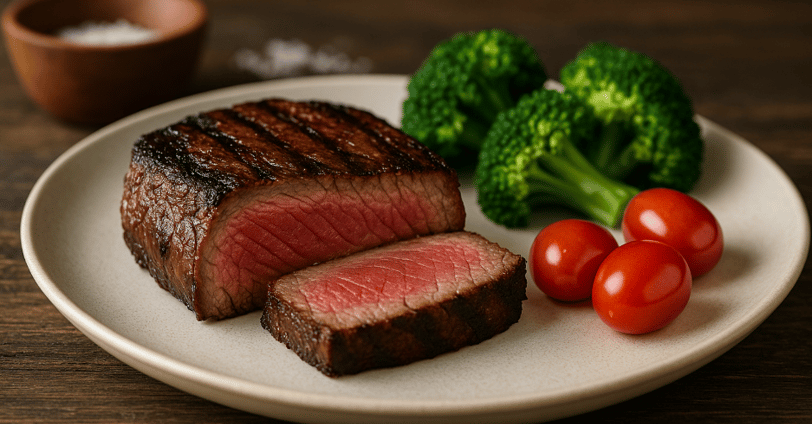The Carnivore Diet: Is It Healthy or a Risky Fad?
The carnivorous diet is fashionable, but is it safe? Discover the benefits, risks and impacts on intestinal health, and see how to balance diet with natural solutions.
6/26/20253 min read


What Is the Carnivore Diet?
The carnivore diet is one of the most talked-about nutrition trends in recent years. Promising rapid weight loss, better mental clarity, and improved metabolism, it appeals to people seeking quick and noticeable health transformations.
This diet is extremely high in animal products—including red meat, poultry, fish, organ meats, eggs, and some dairy with low lactose content. What sets it apart from other low-carb diets is its complete exclusion of plant-based foods, such as grains, fruits, vegetables, legumes, nuts, and seeds.
Some followers go as far as consuming only beef, salt, and water. Proponents of this radical nutritional shift claim they feel more energized, lose weight effortlessly, and experience fewer digestive issues.
But is the carnivore diet really a path to health, or is it a short-term fix with long-term risks?
A Nutrient Profile Out of Balance
Although the carnivore diet eliminates processed junk foods (which is a positive step), it also cuts out some of the most important sources of essential nutrients. Fruits and vegetables provide vitamins, antioxidants, and most importantly—fiber. These are crucial for a healthy digestive system and a balanced gut microbiome.
By removing plant-based foods, the diet deprives the body of:
Vitamin C (essential for immune function and collagen production)
Fiber (vital for gut motility and healthy bowel movements)
Polyphenols and antioxidants (key for reducing inflammation)
Complex carbohydrates (the body’s preferred source of energy)
What Happens When You Remove Carbs?
One of the most controversial aspects of the carnivore diet is its total elimination of carbohydrates. Carbs are often vilified in diet culture, but they serve an important role in providing quick energy for cells, especially the brain.
People who cut carbs too drastically may experience:
Fatigue or low energy
Headaches
Mood swings
Constipation
Nutrient deficiencies
In extreme cases, carb deficiency can lead to serious health issues. A widely cited example is British singer James Blunt, who once adopted a strict meat-only diet and ended up developing scurvy—a condition caused by severe vitamin C deficiency, leading to gum bleeding, fatigue, and weakened immunity.
High Protein Load = Extra Work for the Kidneys
Another concern is the excessive intake of protein and saturated fat. While the body needs protein for muscle repair and hormone production, excess consumption—especially from red meat and full-fat dairy—can stress the kidneys.
The body has to work harder to break down and excrete nitrogen and other waste products generated by protein metabolism. Over time, this can increase the risk of kidney strain, particularly in people with preexisting conditions.
No Fiber = Gut Health Risks
One of the biggest red flags of the carnivore diet is the complete absence of dietary fiber, which is only found in plant-based foods.
Lack of fiber can:
Disrupt bowel movements
Slow down intestinal transit
Harm the diversity of the gut microbiome
Contribute to constipation and bloating
Reduce the absorption of essential nutrients like magnesium and vitamin B12
Your gut houses trillions of bacteria that play a role in everything from digestion to mood. Without fiber to “feed” them, many beneficial bacteria die off, increasing the risk of inflammation and gut-related issues.
💡 Tip: If you’ve reduced fiber and experience digestive discomfort, consider a high-quality probiotic or natural fiber supplement.
Carnivore Diet vs. Other Low-Carb Approaches
The carnivore diet isn't the first to eliminate carbohydrates. Decades ago, Dr. Robert Atkins popularized the Atkins diet, a low-carb plan that allowed some vegetables. Then came keto (ketogenic) diets, paleo, and more recently, intermittent fasting combined with low carb.
What differentiates the carnivore diet is its extreme restriction and lack of long-term scientific support. While keto and paleo include some greens, nuts, and fruits, carnivore is almost entirely meat-based.
Is There Any Benefit?
Some short-term benefits may include:
Weight loss (due to caloric deficit and water loss)
Reduced blood sugar spikes (from no carbohydrate intake)
Appetite suppression (high-protein diets are more satiating)
However, these results may not be sustainable. Many followers eventually reintroduce plant foods after weeks or months of strict meat-only eating due to fatigue, nutrient deficiency, or digestive problems.
The Verdict: Should You Try the Carnivore Diet?
The carnivore diet might offer a temporary improvement in weight and blood sugar control, especially in those with metabolic issues. But from a long-term health and nutrition standpoint, it lacks balance, diversity, and essential nutrients.
A better alternative is to aim for a whole-food-based diet that includes:
Lean proteins (eggs, chicken, fish)
Healthy fats (avocado, olive oil, nuts)
Complex carbs (quinoa, oats, sweet potatoes)
Colorful fruits and vegetables (for antioxidants and fiber)
Natural Supplements to Support Balanced Health
If you're transitioning from restrictive diets or want to support your health naturally, consider adding:
✅ Probiotic supplement → For gut health & microbiome restoration
✅ Vitamin C → To avoid deficiencies during low-fruit diets
✅ Magnesium → For energy, stress, and muscle function
✅ Fiber mix → To support digestion and bowel regularity
✅ Omega-3s → To reduce inflammation from high red meat intake
🏁 Conclusion
While the carnivore diet may sound appealing due to its simplicity and testimonials, it’s crucial to examine the long-term impact on your health. A diet that excludes entire food groups can cause more harm than good, especially when not supervised by a professional.
Balance is key. Choose real, unprocessed foods. Listen to your body. Prioritize variety.And remember: health is a marathon, not a meat-only sprint.
Tags:
#carnivorediet #lowcarb #guthealth #fiberdeficiency #probiotics #naturalremedies #balancednutrition #healthydiet #dietfads #weightloss
Nature
Explore natural solutions for your health.
Health
Solution
info@termeszeteslet.hu
+36123456789
© 2025. All rights reserved.
